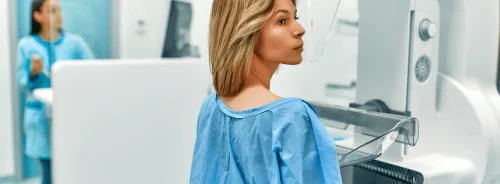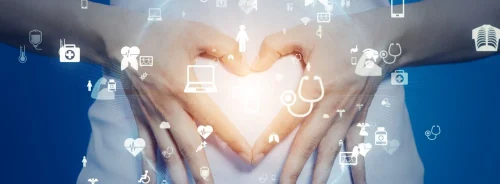EIT Health is a Knowledge and Innovation Community (KIC) established by the European Institute for Innovation & Technology (EIT) in 2016. Bringing together research, innovation and education, its network of partners works together to innovate solutions to Europe's most pressing healthcare needs, ultimately to enable European citizens to live longer, healthier lives.
In terms of education, EIT Health is delivering cutting-edge, innovative trainings to prepare the health workforce to navigate future challenges brought on by an ever-evolving technological and digital landscape in the health and healthcare sectors. These trainings address a large span of learners, from students and researchers to executives, professionals, early entrepreneurs, citizens and patients.
Disruptive Trends in the Health and Healthcare Sectors
Our society is currently undergoing a transformation that will have a high impact on new professions eliminating old professions and creating new ones (Bughin et al. 2018). Understanding the scope and the trends influencing that current transformation will help us to understand the skills needed for the future. In this context, in 2018, EIT Health began to take a closer look at disruptive trends that are transforming the health and healthcare sectors, and thereby identifying European Skill Needs that EIT Health shall prioritise in its development of novel education programmes designed for the future health workforce. Only by knowing what skills are relevant for the future, will we be able to prepare the future health workforce and thus uphold Europe’s innovation capacity.
To understand how health professions will change, we need to understand several ongoing trends which are driving the 4th industrial revolution and how they are affecting the skill needs. The world population has been speedily increasing and growing older, the burden of chronic diseases is also increasing, while the supply of medical professionals are unable to meet the growing needs of patients. Technological developments have also remarkably been on the rise in the last decades (Meskó et al. 2017). Some of these innovations and advances seek to improve the patient experience and reduce the burden of healthcare-related costs, however, the advances have also brought on new challenges particularly for health and healthcare professions. These trends are depicted in Figure 1. EIT Health has classified them as 'disruptive' vs. 'reactive' trends. Disruptive trends are reshaping healthcare and are beyond our control, while reactive trends are emerging as a reaction to these disruptive trends.

Digitalisation: A Closer Look
In our work, we have come to define digitalisation in health and healthcare as involving data, software and tools to analyse and exchange data and hardware to provide new tools. The current worldwide rise in the volume and availability of data goes along with an increase of tools and means to analyse and exchange information. Overall, digitalisation in healthcare has already started to change the ways in which diagnoses are made, treatments are designed, the delivery of healthcare services to patients and, ultimately, the patient experience.
The trend of digitalisation imposes the need for new digital competencies among practitioners, healthcare professionals’ ability to make rational decisions, and the understanding and engagement of the patient him/herself. In our research, we have defined these skills as the competencies to develop and use digital tools with the purpose of accessing, managing, analysing and interpreting data. Ten relevant skills in this area were identified listed here:
Necessary digital competencies
- Basic digital skills
- Advanced data analysis and mathematical skills
- Quantitative and statistical skills
- Advanced IT and programming skills
- Complex information processing and interpretation skills
- Quantitative and statistical skills
- Machine Learning
- Data Mining
- Genomic knowledge and genetic interpretation skills; and
- Automation
EIT Health: Providing Training in Health Digitalisation on a European Level
EIT Health partners are working together to create innovative education offerings and trainings for multiple learner groups, from students and researchers to executives, professionals, early entrepreneurs, citizens and patients. In terms of digitalisation, we aim to provide training and deliver cutting-edge skills on the one hand to health professionals and executives who will adopt and adapt to new technological developments in their workplace; on the other hand, we also train the end user in other words, the citizens and the patients.
EIT Health prepares health professionals to respond to these disruptive trends, for example:
- Real World Evidence already enabled over 500 professionals to understand and innovate the process of real-world data analysis. The aim of the blended training is to lead health professionals to make better decisions in healthcare.
- TeleSTAR teaches professionals how to use a full digital surgical microscope and augmented reality for better practice; and
- Future Skills for Digital Transformation proposes a blended format to train healthcare professionals in the areas of agile development, machine learning, data analytics and blockchain.
In terms of citizen and patient training, EIT Health ultimately aims to improve the health and well-being of European patients and citizens, following a patient-centred approach, where individuals’ specific health needs and health outcomes are the driving force behind all healthcare decisions and quality measurements.
These trainings are designed to empower patients and citizens to use available knowledge, approaches, tools and methods in health innovation to manage their own health while actively taking part in the innovation process – all for the benefit of improved individual and population health outcomes. In this area of work, some best practices include:
- ONCOMMUN provides cancer patients with an innovative platform that merges social nets, videoconferences and monitoring tools. The activity already offered psychosocial support to 500 patients.
- HEALTHY LONELINESS empowers elder citizens with tools to tackle their loneliness, improve their self-esteem and fostering the development of online care systems at home.
- Silver Starters empowers seniors to become entrepreneurs by training elder citizens in how to start their own businesses in healthy living and active ageing.
- E-PRO is a MOOC course which empowers cancer patients to gain science-proof knowledge on radiotherapy and make informed decisions regarding treatment options.
- Get Wise will create an innovative online platform to provide patients with intellectual disabilities with knowledge, skills and confidence to manage their own health; and
- ACTIVEHIP will provide hip fracture patients and their caregivers with an integral tool to manage patients’ health. The online platform will include content on physical exercises, nutrition, medication and environmental recommendations.
Looking to the Future: Health Professional Education on a European Level
EIT Health’s mandate is to act as an incubator of innovative health education programmes. Our mission also strengthens and contributes to the wider European health agenda. We expect that our efforts will be adopted by the European education market and continue to thrive and shape Europe’s future professionals and leaders. As the landscape of digital transformation continues to morph at a rapid pace, the trainings are designed to meet the challenges of lifelong learning to help health professionals thrive in the future.










